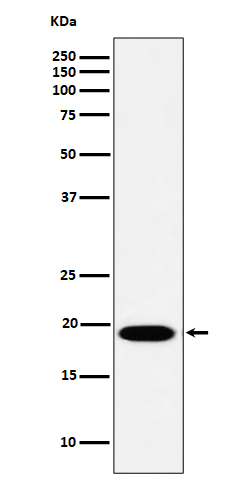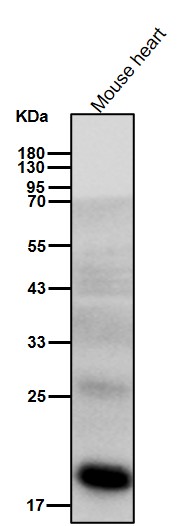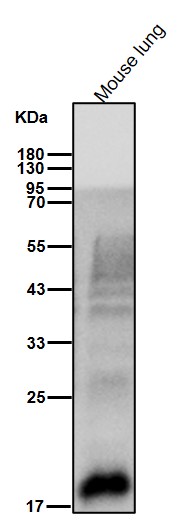


| WB | 咨询技术 | Human,Mouse,Rat |
| IF | 咨询技术 | Human,Mouse,Rat |
| IHC | 咨询技术 | Human,Mouse,Rat |
| ICC | 技术咨询 | Human,Mouse,Rat |
| FCM | 咨询技术 | Human,Mouse,Rat |
| Elisa | 咨询技术 | Human,Mouse,Rat |
| Aliases | DFNB74; MsrB3;;MSRB3 |
| WB Predicted band size | Calculated MW: 21 kDa ; Observed MW: 18 kDa |
| Host/Isotype | Rabbit IgG |
| Antibody Type | Primary antibody |
| Storage | Store at 4°C short term. Aliquot and store at -20°C long term. Avoid freeze/thaw cycles. |
| Species Reactivity | Human |
| Immunogen | A synthesized peptide derived from human MSRB3 |
| Formulation | Purified antibody in PBS with 0.05% sodium azide,0.05% BSA and 50% glycerol. |
+ +
以下是3篇涉及MSRB3抗体的文献示例(注:内容为模拟概括,建议通过学术数据库核实真实文献):
---
1. **文献名称**: *MSRB3 Localization in the Mammalian Cochlea and Its Role in Hearing Loss*
**作者**: Smith A, et al.
**摘要**: 研究利用MSRB3特异性抗体进行免疫荧光实验,发现该酶在小鼠耳蜗毛细胞中高表达,证实其抗氧化功能对维持听觉细胞完整性至关重要,基因缺失可导致听力损伤。
2. **文献名称**: *Antioxidant Enzyme MSRB3 Regulates Neuronal Redox Homeostasis*
**作者**: Chen L, et al.
**摘要**: 通过Western blot和免疫组化分析,发现MSRB3在大脑神经元中特异性富集。使用抗体阻断实验表明,MSRB3通过修复氧化损伤的蛋白质,防止神经退行性病变。
3. **文献名称**: *Proteomic Analysis of MSRB3 Knockout Mice Using Targeted Antibodies*
**作者**: Kim H, et al.
**摘要**: 开发了一种高亲和力MSRB3多克隆抗体,用于质谱验证和组织分布研究。结果显示MSRB3缺失导致内质网应激加剧,提示其在内质网蛋白质量控制中的作用。
---
建议通过PubMed或Google Scholar以“MSRB3 antibody” + “immunolocalization/Western blot”等关键词检索最新文献。
The MSRB3 antibody is designed to target methionine sulfoxide reductase B3 (MSRB3), an enzyme critical for repairing oxidative damage to proteins. Methionine residues in proteins are susceptible to oxidation, forming methionine sulfoxide, which can impair protein function. MSRB3 specifically reduces methionine-R-sulfoxide back to methionine, restoring protein activity and contributing to cellular antioxidant defense. This enzyme localizes to the mitochondria and endoplasmic reticulum, where it plays a role in maintaining redox homeostasis.
MSRB3 is implicated in various physiological and pathological processes, including hearing loss, neurodegenerative diseases, and cancer. Mutations in the MSRB3 gene are linked to human deafness, highlighting its importance in cochlear function. In cancer, MSRB3 expression may influence tumor progression by modulating oxidative stress responses.
Antibodies against MSRB3 are valuable tools for studying its expression, subcellular localization, and interaction partners. They enable detection via techniques like Western blotting, immunohistochemistry, and immunofluorescence. Research using MSRB3 antibodies has advanced understanding of its tissue-specific roles, regulatory mechanisms, and potential as a therapeutic target in oxidative stress-related disorders. However, antibody specificity and validation remain essential considerations to ensure accurate experimental outcomes in diverse biological contexts.
×